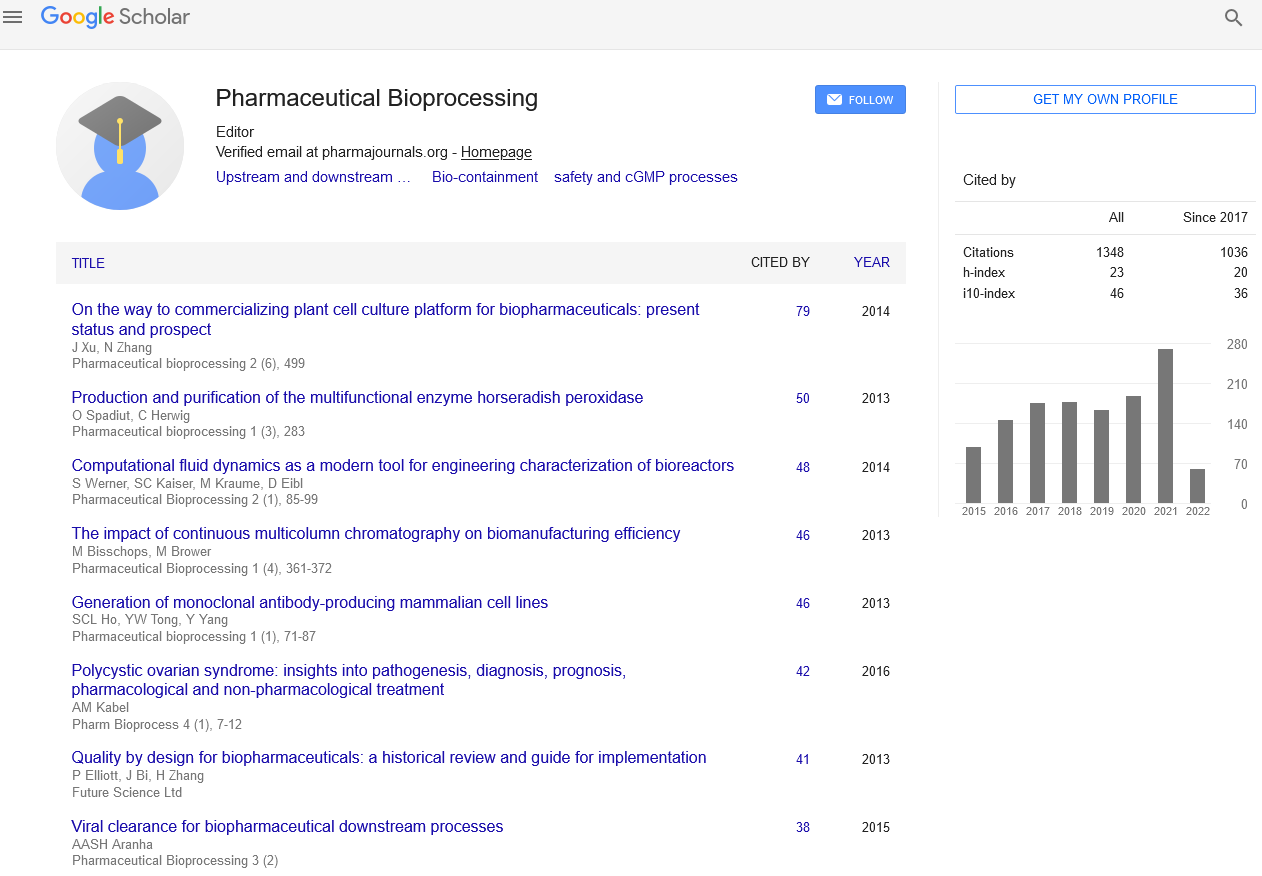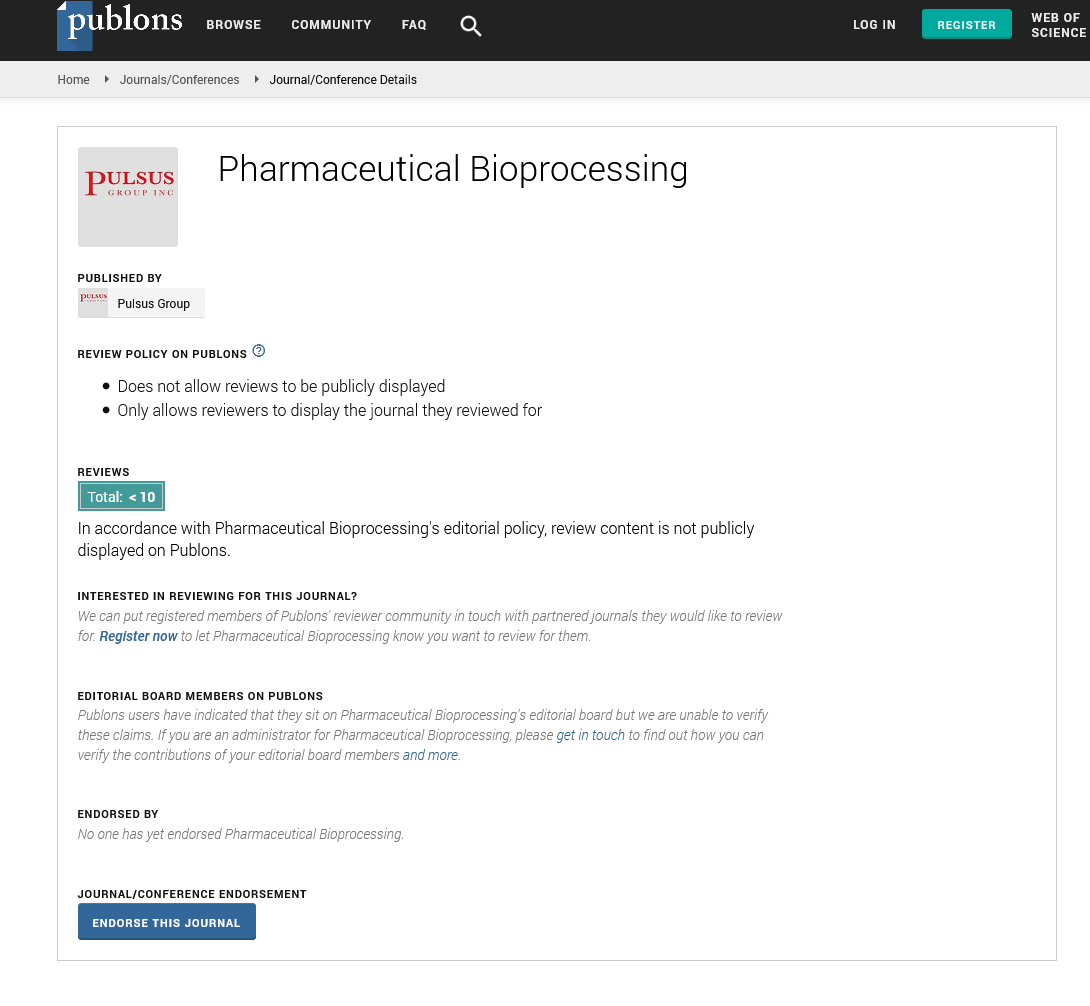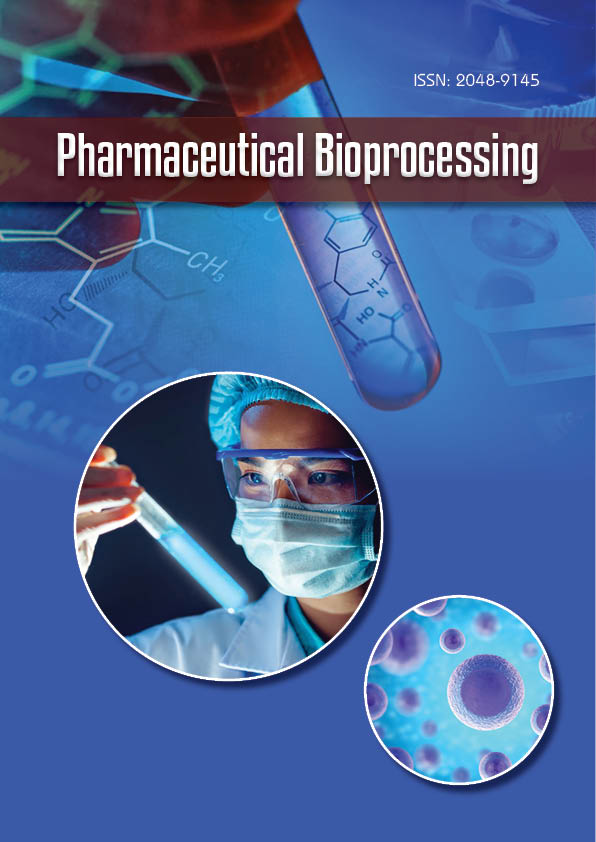Perspective - Pharmaceutical Bioprocessing (2023) Volume 11, Issue 5
Bioprocessing: Unlocking the Potential of Nature for a Sustainable Future
- Corresponding Author:
- David Nielsen
Department of Metabolic Engineering,
Arizona University,
Tempe,
United States
E-mail: David.Nielsen@asu.edu
Received: 15-Sep-2023, Manuscript No. FMPB-23-118580; Editor assigned: 20-Sep-2023, PreQC No. FMPB-23-118580 (PQ); Reviewed: 04-Oct-2023, QC No. FMPB-23-118580; Revised: 19-Oct-2023, Manuscript No. FMPB-23-118580 (R); Published: 27-Oct-2023, DOI: 10.37532/2048-9145.2023.11(5).102-103
Introduction
Bio process, otherwise called bioprocessing or bioproducing, alludes to the utilization of organic frameworks and living organic entities to create significant items, going from drugs and biofuels to food fixings also, specialty synthetic compounds. It includes the use of different organic strategies and designing standards to tackle the capability of living organic entities for industrial scale creation. The field of bio process has seen huge progressions as of late, upsetting businesses and offering supportable and effective other options to conventional assembling processes. This article investigates the key ideas, applications and future possibilities of bio process. Bio process, otherwise called bioprocessing, is a field of concentrate inside biotechnology that centers around the utilization of living creatures or their parts to deliver significant items on a modern scale. It includes bridling the force of organic frameworks, such as microorganisms or compounds, to complete explicit capabilities that can be applied in different businesses. Bio process plays a critical job in the development of biopharmaceuticals, which are restorative substances, got from organic sources. These incorporate immunizations, antibodies, chemicals, and proteins utilized for different clinical medicines.
Description
Bioprocessing, a cutting-edge field at the intersection of biology and engineering, is revolutionizing industries from pharmaceuticals to biofuels, and even food production. It involves the use of biological organisms, such as bacteria, yeast and enzymes, to produce valuable products, and it is increasingly recognized for its potential to address some of the most pressing challenges of our time. In this article, we will explore the exciting world of bioprocessing, its applications, and its role in shaping a sustainable future.
The essence of bioprocessing
Bioprocessing is the art and science of using living organisms or their components to manufacture products or to perform a particular industrial process. It harnesses the power of biology, often at the molecular level, to achieve various goals. Bioprocessing can involve a wide array of biological agents, including:
Microorganisms: Bacteria, yeast, and algae are commonly used in bioprocessing for their ability to produce valuable chemicals, pharmaceuticals, and biofuels.
Enzymes: These biological catalysts facilitate chemical reactions, making them indispensable in various industries.
Plant and animal cells: Bioprocessing is also used in the field of tissue engineering and regenerative medicine, where cells are manipulated to create tissues and organs for transplantation.
Applications of bioprocessing
Pharmaceuticals: Bioprocessing is a cornerstone of the pharmaceutical industry, enabling the production of biopharmaceuticals like insulin and monoclonal antibodies. These products are used to treat a wide range of diseases, including diabetes, cancer and autoimmune disorders.
Biofuels: Bioprocessing is essential in the development of biofuels, offering a sustainable alternative to fossil fuels. Microorganisms are used to convert biomass into bioethanol, biodiesel and other renewable fuels.
Food and beverages: Enzymes and microorganisms are used in the food industry to improve flavor, texture and shelf life. Bioprocessing is also integral in the production of beer, wine and various dairy products.
Wastewater treatment: Bioprocessing aids in the treatment of wastewater by harnessing the power of microorganisms to break down contaminants and pollutants.
Environmental remediation: Bioprocessing technologies are being developed for cleaning up contaminated environments, such as oil spills or industrial sites with hazardous waste.
Sustainability and bioprocessing
One of the primary reasons bioprocessing is gaining momentum is its strong alignment with sustainability goals:
Reduced environmental impact: Bioprocessing often generates fewer harmful byproducts and emissions compared to traditional chemical processes, making it a cleaner and more eco-friendly choice.
Reduced dependence on fossil fuels: Biofuels produced through bioprocessing reduce our reliance on fossil fuels, helping combat climate change.
Resource efficiency: Bioprocessing can utilize renewable resources, such as agricultural waste, as feedstock, minimizing waste and promoting resource efficiency.
Biodegradable products: Many products created through bioprocessing are biodegradable, reducing the burden on landfills and the environment.
Challenges and limitations
Despite its immense potential, bioprocessing faces several challenges:
Complexity: Manipulating biological systems can be highly complex and unpredictable, requiring a deep understanding of biology and chemistry.
Regulatory hurdles: Regulations for bioprocessed products vary by region and can be complex to navigate.
Scaling up: Transitioning from laboratory-scale processes to large-scale industrial production can be challenging and costly.
Economic viability: Some bioprocessed products may still be more expensive than their traditional counterparts, posing economic barriers to adoption.
Conclusion
Bioprocessing is at the forefront of sustainable innovation, offering solutions to pressing challenges in healthcare, energy, and environmental conservation. Its ability to harness the power of nature to produce valuable products with minimal environmental impact makes it a critical player in shaping a more sustainable future. As research and development in bioprocessing continue to advance, we can expect even more breakthroughs and applications, ultimately contributing to a healthier planet and improved quality of life for people around the world. Bioprocessing is not just a field of science; it’s a beacon of hope for a more sustainable and prosperous future.


